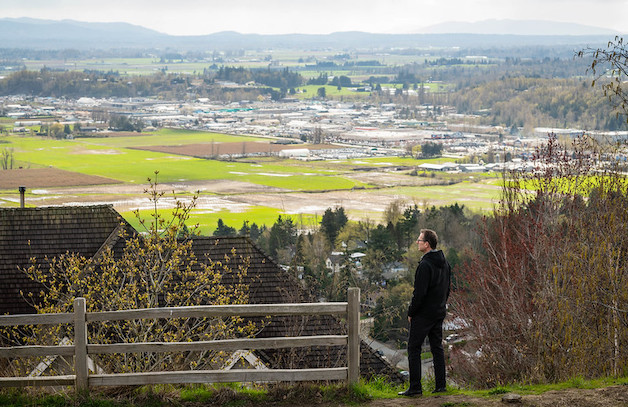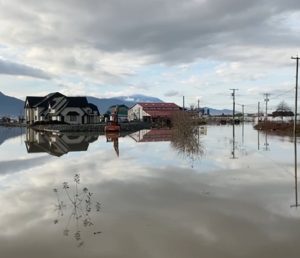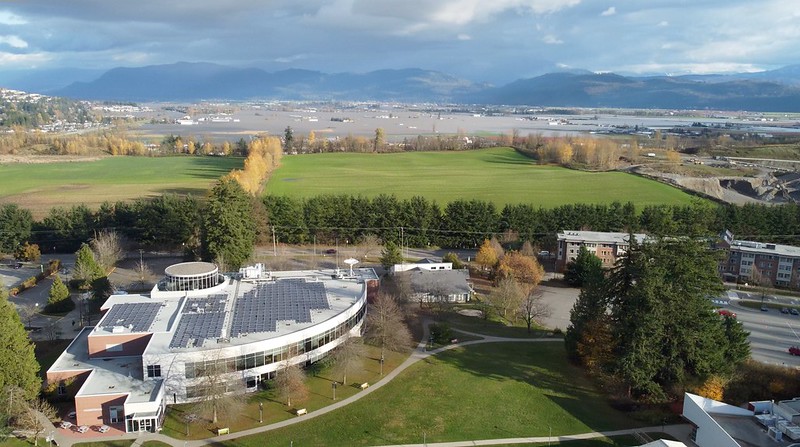After the Flood — UFV helped launch Abbotsford Disaster Relief Fund
When the devastating floods of November 2021 inundated parts of the Fraser Valley, former UFV VP External Craig Toews and his team leapt into action to help a traumatized community recover.

Every resident in the Fraser Valley can probably tell you exactly where they were on November 14 and 15, 2021, and the rain-soaked days that followed.
The atmospheric river that rocked Abbotsford and neighbouring communities was one of those surreal and painful events that will be forever seared into locals’ memories.
Roads, homes, and farmland were submerged in water. Mudslides severed transportation routes. Farmers lost their livelihoods. Families lost their homes.
People and animals lost their lives across a broad swath of British Columbia.
Everyone was impacted: some worse than others. And, for many, it will take years to recover, if they ever do.
“Our community was hurting,” says Craig Toews, who has been UFV’s Vice-President External since 2017 and an employee at UFV for 34 years. “The damage done to people’s homes and livelihoods, especially our farmers, who are the fabric of our community, was devastating to witness in those initial days.”
Toews has deep roots in the Fraser Valley. He has lived in Abbotsford for his entire adult life and his extended family has agricultural roots extending back several generations. He has witnessed plenty of extreme weather situations, like the Nooksack flood in 1990, but nothing like this.

In the early evening of November 14, Toews and his family were driving the Coquihalla Highway, trapped in the heart of the storm. Under the immediate threat of an imminent landslide, they were rerouted in every possible direction. First, they were directed to nearby Princeton, where the rising river was teetering on the edges of banks. Then it was Manning Park, where the Allison Pass summit had experienced its own landslide. And finally, they traveled to Hope, where power had been wiped out.
Toews had a pivotal decision to make. Ride out the storm and stay the night in Hope in a shelter. Or head up towards Agassiz to try to get home. He chose the latter and experienced a few close calls.
“Driving up the hill just east of Agassiz, we hit a brown river of muddy water that knocked out our vision for about 10 seconds, and then we hit a second one,” he says. “We were lucky because 30 minutes later, the mountain came down and pushed cars off the edge of the road there, that whole ridge let go. So it was very scary.”
Immediately after arriving safely at home, Toews and his family, like many other Fraser Valley residents, did everything they could to support their neighbours. He helped a family in distress clean out a flooded basement and salvage precious belongings. He and his wife Eleonore hosted a dinner for that same family.
With wide-scale infrastructure and farmlands destroyed, Toews understood that the bigger recovery effort was going to require significant resources and a greater degree of coordination. When Toews returned to work in the following days, he found that his colleagues in Advancement, Marketing, and Communications were just as inspired and passionate as he was to assist a community in dire need.
“I didn’t even have to pitch the idea,” says Toews, who retired in July. “Everyone at UFV was willing to give their time and expertise.”

Anita Nielsen, Executive Director of UFV’s Advancement team, and her staff had already conceptualized the idea of setting up an emergency donation fund by forming a fundraising coalition with external organizations. Within 48 hours, the university partnered with the Abbotsford Community Foundation (ACF), which works with a wide network of local charities daily, and the Abbotsford Chamber of Commerce (ACOC), which has deep relationships with the city’s business community and farmers, to establish the Abbotsford Disaster Relief Fund (ADRF).
“I knew our coalition could get something up and running immediately,” says Nielsen. “It was a tremendous undertaking. Most of my team set up shop at ACF for the six weeks leading up to Christmas. It was something we had to do for our neighbours.”
The coalition partners immediately set up a portal on the ACF’s website to accept donations and applications from those affected to receive grants. UFV’s role would be to help market and promote the fund, liaise with charities and victims, and assist in processing the huge surge in donations. Many UFV staff pitched in.
“We were elated, but somewhat overwhelmed, to see a new donation come in every 15 seconds,” says Wendy Neufeld, Executive Director of the Abbotsford Community Foundation. “Some mornings, we would open our mail and there would be $250,000 worth of cheques to process!”
Donations started to arrive from throughout British Columbia but also from as far away as Germany, Australia, and Taiwan.
The ADRF has raised over $4.25 million and disbursed grants to more than 20 not-for-profit organizations, and nearly 100 businesses and farmers as well as 116 individuals who lost their belongings in a local storage facility. The impact has been significant.
Farmers, for example, can quickly receive a cheque from the ADRF after a simple vetting process. The streamlined access to much-needed funds helped offset dependency on government assistance and filled the gap for those waiting for insurance claims.
Funds dispersed by the ADRF helped recipient groups help others. Mamas for Mamas, a charity that supports mothers and caregivers in crisis by providing ongoing financial support to individuals and families, donated everything from strollers to shelter to transportation for hundreds of families. They helped provide a helicopter for a single dad and his young teenager caught in the mudslides.

“Mamas for Mamas helped us greatly by providing multiple forms of aid while my daughter and I traversed the challenges of getting home,” said that father. “They also provided support in the following weeks, checking in regularly and making sure we were well and offering any additional assistance they may have to offer.”
Another charity, the Crisis Centre of BC, aided locals by providing information about emergency shelters and services and ensuring the people they connected with felt heard and supported.
“What we’re specifically able to do is help people pinpoint and address their most current need, while scanning for emotional distress and suicide risk factors,” said Stacy Ashton, Executive Director of the Crisis Centre of BC.
At the Arnold Community Church, volunteers rallied to create a waste collection program with heavy equipment and an official waste site where people could dump their contaminated belongings.
Their army of volunteers hauled over 220 dump truck loads amounting to 1.1 million pounds of garbage.
The church also mobilized a food hamper and free lunches for those who lost their homes and were in transition.
“One of the really important elements of our ethos right from the beginning was we wanted to identify any gaps,” Toews says. “A lot of folks do not have insurance or access to government grants, so we needed to ensure those victims were not forgotten and that they were given the assistance they needed.”
While Toews’ time at UFV came to an end with his retirement in July, he and the ADRF team are ensuring that the fund continues to support the community.
“Honestly, this whole operation really energized me and the people around me because we take great pride in this community,” says Toews, noting UFV has been awarded the 2022 Economic Resiliency & Recovery Award from the BC Economic Development Awards for our work done as part of the Abbotsford Disaster Relief Fund. “For me, I’m so proud of how the university and our partners have responded and provided relief when it was most needed.”
“Now that we’re past the initial recovery, there’s still a lot of work to do,” says Toews. “Victims of the flood still need access to everything from mental health services to food hampers to contractors.”
English professor provides writing as healing for farmers
The car was packed and ready to go.
Dr. Michelle Superle and her husband knew a text that would instruct them to evacuate their home in Yarrow was coming anytime. The torrential downpour that happened just a few days earlier resulted in widely publicized flooding that started in the Sumas Prairie in Abbotsford and now had slowly crept its way into Chilliwack’s backyard.
When the couple finally got the notification to evacuate, they loaded their daughter, aging pets, and a couple of suitcases into the car. Leaving felt like they were in a movie as they took in surroundings full of emergency vehicles, flooded roads, cars towing trailers with livestock, and abandoned farmland.
“Leaving Yarrow was absolutely surreal, it looked like a different world,” says Superle, an associate professor in the UFV English department.
Superle’s home was undamaged when the family returned two days later. She immediately began volunteering at the Yarrow Food Hub, which assists farmers and residents who were displaced because of the floods.
“While I was at the food hub, I heard farmers talk about their experiences of being evacuated, being out of their homes, and the kinds of things that were happening on their property,” says Superle, who is also a research associate at the UFV Food and Agriculture Institute.
With the farmers’ livelihood literally stripped from them overnight, combined with the uncertainty around their future and the ongoing stresses of the pandemic, Superle grew concerned for the farming community’s well-being. She wondered whether writing could help as a form of expression and healing.
That question was answered a few weeks later when she came across a student research essay that was written by Lauryn Joly, a first-year English student at UFV, on how expressive writing a narrative therapy can be very powerful ways of processing experiences. The essay was written before the floods, but Superle immediately saw the parallels.
As a result, Superle launched the Flood Stories, a multi-faceted project that aims to support healing for farmers in her community. One element of the project is interviewing and collecting farmers’ first-person narratives of the flood to use for publication; Superle hopes these stories will, “raise awareness about the severity of the situation and the importance of our farmers.”
Another element of the Flood Stories project is the Writing as a Way of Healing workshop, which teaches simple journaling techniques to any farmer or Fraser Valley resident who needs a creative outlet to deal with trauma associated with the flooding. “When I was running the idea of a writing for healing workshop by the farmers, I was surprised by the interest,” Superle says. “With everything going on, I thought it might be too much — or that nobody would have the time. But people have been very enthusiastic about it.”
This article originally appeared in the 2022 edition of UFV’s Skookum magazine. See the PDF version of Skookum here.




